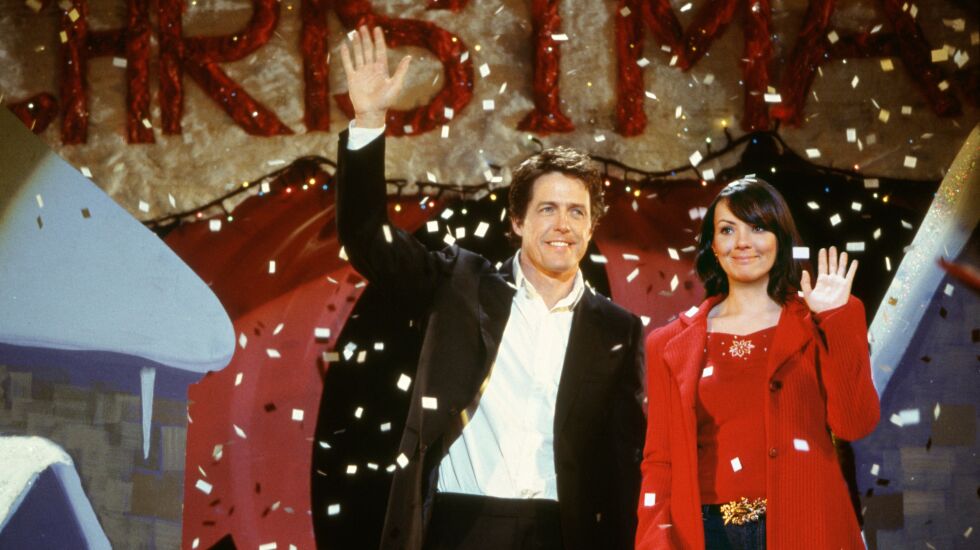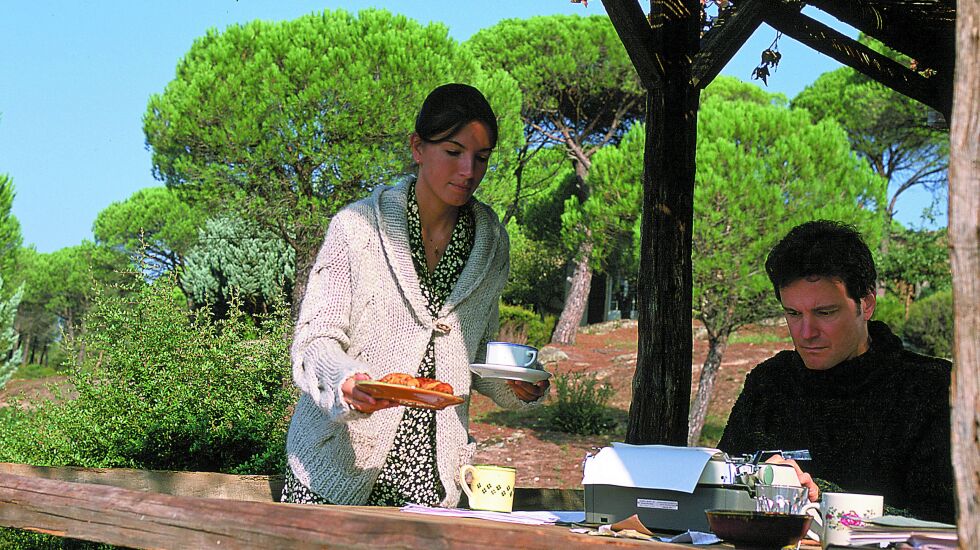
The first images we see in “Love Actually” are real-life human beings joyously reuniting at London’s Heathrow Airport, as a voice-over intones, “Whenever I get gloomy with the state of the world, I think about the arrivals gate at Heathrow Airport. General opinion is starting to make out that we live in a world of hatred and greed. But I don’t see that. Seems to me that love is everywhere. Often, it’s not particularly dignified or newsworthy, but it’s always there … If you look for it, I’ve got a sneaky feeling you’ll find that love actually is all around.”
That we eventually learn this lovely and unabashedly corny sentiment is voiced by the prime minister of the United Kingdom only strengthens the case that Richard Curtis’ perennial holiday favorite, while ostensibly grounded in a myriad of semi-plausible storylines, is also a live-action fairytale. It’s a romantic comedy about romantic comedies, swaddling itself in rom-com tropes, from the characters who fall in love despite hardly knowing each other to the guy who feigns dislike of a girl because he’s secretly in love with her to the poor fool who comes home to find out his girlfriend is sleeping with his brother to the mad dash through the airport to declare one’s intentions to someone who’s leaving on a jet plane.
Nov. 7, 2003, was the Chicago release date for two films that were destined to become holiday favorites: “Love Actually,” which was a moderate hit in the United States with a gross of $60 million but pulled in more than $185 million internationally for a worldwide total of $247.9 million, and “Elf,” with a domestic take of $178 million and a total global pull of $227 million. It could be argued these were the last two holiday classics of our time, given the current climate in which we get a snowstorm of sweet but forgettable made-for-TV holiday movies every year, along with dark fare along the lines of “Violent Night” and “The Mean One” and “It’s a Wonderful Knife.”
In recent years, a number of critics have hurled frozen snowballs at “Love Actually,” making valid points about the power imbalance between men and women in a number of the love stories and the lack of diversity in the cast. For countless fans, though, it remains a must-view every Christmas season. If you’re planning a 20th anniversary rewatch of “Love Actually” — or catching it for the first time — a few things to look for along the way …
Almost famous and already famous
Writer-director Curtis wanted a mix of well-known actors and up-and-comers for the cast, which included familiar faces such as Colin Firth, Hugh Grant, Emma Thompson and Alan Rickman, and relative unknowns including January Jones, Andrew Lincoln and Martin Freeman. In a Daily Beast article, Curtis recalled Keira Knightley telling him about her next project: “I’ve probably made a terrible mistake, but I’m doing this pirates movie, but it will at least be a few fun months in the sun.”
Mind the (age) gap
In a tweet that did the proverbial Breaking of the Internet, actor Madeleine Lloyd-Jones blew our minds with her “Yearly reminder that there is only a five-year age gap between Thomas Brodie-Sangster and Keira Knightley in ‘Love Actually.’ ”
That’s a true thing. Brodie-Sangster was 13 when he played 10-year-old Sam, while Knightley was only 18 when she portrayed Juliet. (They didn’t have any scenes together.)
A decade later, the 23-year-old Brodie-Sangster was cast in “Game of Thrones” as Jojen Reed — who was 13 years old.
Love ‘stories’
Two of the nine stories in “Love Actually” were originally intended as separate, feature-length films: the romances between Hugh Grant’s David and Martine McCutcheon’s Natalie and Colin Firth’s Jamie and Lúcia Moniz’s Aurelia. Curtis also cut four additional storylines from the film, including two that were filmed but cut in post.
Mark: We need to talk
There’s no denying that Andrew Lincoln’s Mark is quite the dodgy bounder, what with his obsession with his best friend’s new bride that entails him shooting a wedding video that could be used as evidence to obtain a restraining order. When Knightley’s Juliet visits Mark and finds the supposedly “lost” video (“There’s one that says, ‘Peter and Juliet’s Wedding,’ do you think we might be on the right track?”), the film acknowledges Mark’s voyeurism via the placement of a copy of “Rear Window” on the shelf.
Pop-in anytime!
In scene after scene, folks just show up unannounced, usually with a grand plan or announcement in mind:
- Juliet pops in at Mark’s to search for the wedding video.
- Billy Mack (Bill Nighy) surprises his old pal Joe (Gregor Fisher).
- Mark’s “cards on the doorstep” moment with Juliet.
- David goes door to door looking for Natalie, and in the process, we learn Mia (Heike Makatsch) lives next door to Natalie.
- Jamie does an international pop-in when he shocks Aurélia at her restaurant job in Marseille, France, and declares his love in broken Portuguese: “I know I seems an insane person — because I hardly knows you — but sometimes things are so transparency, they don’t need evidential proof.”

‘Love Actually’ Barbies
“Now, which doll shall we give Daisy’s little friend Emily?” The Barbie dolls that Karen wraps as gifts are actually Ken dolls in drag.
Memorable quotes
“We may be a small country, but we’re a great one, too. The country of Shakespeare, Churchill, the Beatles, Sean Connery, Harry Potter, David Beckham’s right foot, David Beckham’s left foot…” — David.
“There was more than one lobster present at the birth of Jesus?” — Karen.
“It’s a terrible, terrible mistake, Chubs. But you turned out to be the f---ing love of my life.” — Billy Mack.
“Hello David, I mean, Sir. S- - -, I can’t believe I’ve just said that. And now I’ve gone and said ‘s- - -’. Twice. Oh, I’m so sorry Sir.” — Natalie.
“The octopus costume has taken me months. Eight is a lot of legs, David.” — Natalie’s mother.
“The thing about romance is people only get together right at the very end.” — Sam.







